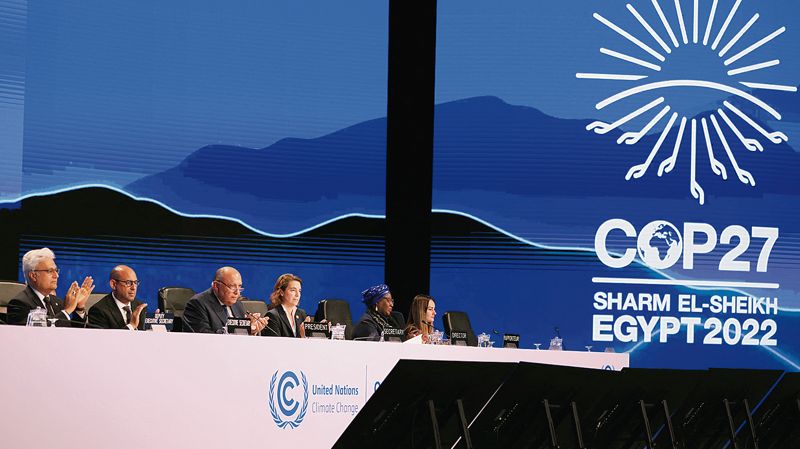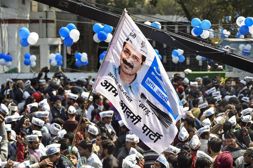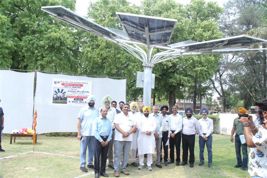
Predicament: Every developing country is facing the challenge of balancing the need to burn more oil and reducing emissions at the same time. Reuters
Strategic Analyst
India was in the throes of climate action last weekend. The appointment of the President-designate for the 28th Conference of the Parties (COP28) in Dubai later this year, along with his leadership team, galvanised the Indian Government into action. RK Singh, the Minister for Power and New and Renewable Energy, was among the first foreign officials to congratulate in person and pledge support to Sultan Ahmed Al Jaber of the UAE, who will lead the next climate change conference. Afterwards, Singh presided over the Assembly of a UN body, the Abu Dhabi-based International Renewable Energy Agency (IRENA). It was attended by 1,500 delegates, who included heads of state, ministers, energy decision-makers from multilateral organisations and stakeholders in global energy transition. The Assembly took stock of priorities in preparation for COP28.
Climate summit outcomes have not been satisfactory, raising the question: Why have a global climate change conference at a huge cost year after year?
Simultaneously, Hardeep Singh Puri, the Minister for Petroleum and Natural Gas, made a series of announcements that will unilaterally take on India’s climate challenges, even as the country’s leadership will expand its role multilaterally in dealing with the global climate crisis. ‘We are launching a Global Alliance on Biofuels, along with the United States of America and Brazil during India’s Presidency of the Group of 20 countries,’ Puri said. Whether it will be spun off the existing Toronto-based Global Renewable Fuels Alliance – an industry group representing 90 per cent of the world’s renewable fuels production – or have a new avatar like the International Solar Alliance (ISA) will be known as India’s G20 presidency consolidates.
Puri also outlined India’s four-pronged energy security strategy: diversification of energy supplies, increasing oil and gas exploration, switching to alternative energy sources and using green hydrogen as well as electric vehicles. He calculated that diesel prices in India had gone up by merely 3 per cent in the last one year, compared to high double-digit increases throughout the developed world. The cause was the Ukraine crisis, from which consumers in India were insulated, compounded by cuts in central excise duty and varying value-added tax cuts by states.
Puri, External Affairs Minister S Jaishankar and the Minister of Environment, Forest and Climate Change, Bhupender Yadav envisioned greater Indian involvement in the COP in Dubai in various ways. Never before, since the first COP was held in Berlin in 1995, has the announcement of a leadership team for the conference in any year invigorated India’s government as in 2023. It was as if the climate conference this year was their own. Partly this was because Al Jaber is a close friend of India, with whom the entire Indian establishment has been engaged at every step since the UAE became one of India’s top external affairs priorities in 2015. For the other part, it was because India sees a pathway to synergy between its own leadership of the G20 and the UAE’s counterpart role at COP28 led by Al Jaber.
There has been some criticism that inherent in Al Jaber’s new role is a conflict of interest because, among his many jobs, Al Jaber is CEO of the Abu Dhabi National Oil Company, which, in terms of production, is the world’s 12th-largest of its kind. He is also the UAE’s minister of industry and advanced technology. His biggest credential to be the next COP President is that he is also the founding CEO of Masdar, which aims to be the world’s biggest green energy company. As his country’s Special Envoy for Climate Change, Al Jaber was instrumental in making the UAE the first country in its region to ratify the Paris Climate Agreement of 2015-16 and to announce a strategic initiative of Net Zero by 2050.
Concerns about such conflict of interest are similar to those levelled against India by environment lobbies. As economic development intensifies, India needs more oil. India is also seeking action against global warming and other fallout of weather changes. Puri said last week that the number of India’s crude oil suppliers had risen from 27 to 39 countries last year. This is every developing country’s dilemma: the need to burn more oil and reduce emissions at the same time. When COP27 was held in Sharm El-Sheikh two months ago, this was Egypt’s dilemma, too, since it is both a developing country and an exporter of fossil fuels. The meeting in Sharm El-Sheikh did not satisfy anyone, judging by post-conference reactions. COP26 in Glasgow a year earlier was only marginally better in its outcomes.
It raises the question: Why have a global climate change conference at a huge cost year after year? Part of the answer is that for politicians, it is a route for career-building. The best example is Angela Merkel who was President of COP1. Originally from communist East Germany, she had only shortly before been appointed reunified Germany’s environment minister. The success in her first big political job on the global stage, brought about with considerable Indian support, paved the way to Merkel’s eventual ascension as German Chancellor, a post she held for 16 years.
Al Jaber is not a politician. He is a technocrat, unlike his predecessor, the President of COP27, Egyptian foreign minister Sameh Shoukry. Many others before Shoukry were also politicians. As a technocrat, Al Jaber was appointed in 2009 by UN Secretary General Ban Ki-moon to his Advisory Group on Energy and Climate Change, which created the highly acclaimed Sustainable Energy for All initiative launched in 2011. A year prior, Al Jaber received an Honorary Doctorate in Philosophy from India’s TERI University. COP28 will engage in the first global stocktaking since the Paris Agreement. It will have recommendations on the future of annual COPs and build the foundation for momentum in the tasks ahead.
Join Whatsapp Channel of The Tribune for latest updates.




























